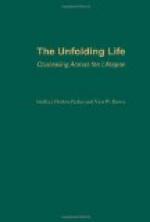HABIT FORMATION
The discussion of these marked characteristics of the life is given added import when we realize that these years are in the height of the habit forming period. All through Early Childhood and Childhood every act has left its faint tracing upon the plastic cells of the brain, and some of the markings are deep ere now. Just as water will follow its channel rather than cut a new course, so activity will expend itself in the well-traced pathways unless prevented from so doing, and the same thought or stimulus will always tend to go out in the same action. No thinking is necessary upon these habitual acts which constitute “nine tenths of life”—they have become mechanical. Not only in the body does life acquire fixed habits, but also in the soul, in thinking, feeling and choosing.
The seriousness as well as the value of a habit lies in its tenacity. No harder task ever confronts a life than to break up one habit and substitute another after the brain cells grow hard. The process requires not only that activity be directed away from the pathway that irresistibly draws it, but at the same time a new groove be traced upon the hard, unyielding cells. The task is difficult beyond expression. This is why reformed men always have a hidden fear of lapsing into the former life. It is the call of the old pathway, traced so deeply in the brain.
A mature woman, brought up to the strictest Sabbath observance, came to believe that “the Sabbath was made for man and not man for the Sabbath,” and therefore essayed to act on that day according to her reason and judgment. The attempt was soon abandoned. “There is no pleasure in it,” she said. “I am constantly fighting the old habits of my girlhood life, and they will not cease their call to me.” This is what the wise king meant when he said, “Train up a child in the way he should go, and when he is old he will not depart from it.” The whole tendency is to “ask for the old paths,” that there “may be rest to the soul.” A part of the miracle of conversion in later life appears in God’s power to trace new pathways when the brain is hardened, and to keep life in them, moment by moment, against the tug of the old.
Three statements will crystallize the discussion. First: The years up to twelve present two conditions for habit formation—plastic brain cells and action easily secured—as no succeeding years present them.
Second: Habit formation, either right or wrong, is constantly going on, for every action leaves its impress and makes repetition easier.
Third: Right habits may be formed as easily as wrong, if the task is definitely undertaken.
Since the importance of these years is clearly evident, the method of habit formation may be briefly stated. First, secure the desired action; second, secure its successive repetition without a lapse, as far as possible.




